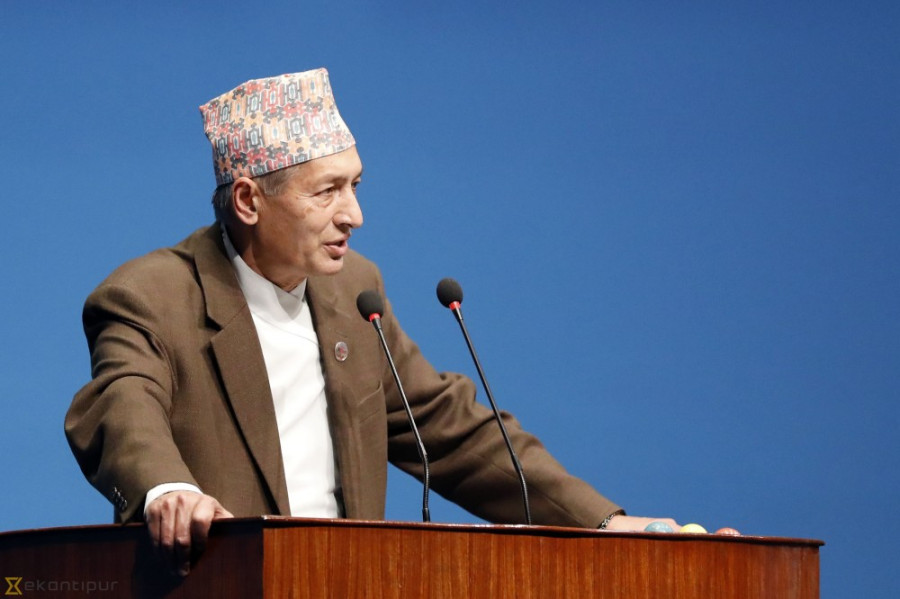National
Finance minister should avoid populist budget and focus on realistic programmes, economists say
Yubaraj Khatiwada will present the budget for upcoming fiscal year amid mounting challenges
Rajesh Khanal
As Finance Minister Yubaraj Khatiwada gears up for the budget for the fiscal year 2019-20, the first one after the strongest government in decades in Nepal completed its one year, there are some glaring challenges he needs to address, experts and economists say.
Khatiwada, a technocrat who is well-versed on economic and financial issues, while being pressed for demonstrating his acumen, he will also have to resist political pressure when it comes to, say, pork barrel funds. And as the budget day approaches, it looks like it will be a tightrope walk for the finance minister.
Khatiwada will be presenting the budget for the upcoming fiscal year amid resource crunch, slow capital expenditure, bureaucratic hassles, widening trade deficit, high interest rate—and above all widespread public criticism that the government has largely failed on most of the fronts.
Analysts say the government, rather than going for populist budget should focus on realistic and achievable programmes.
Chandan Sapkota, an economist who writes extensively on economy and finance, said the government this time has to come up with clear execution plans through the budget announcement to check and balance the budget disbursement and its effective implementation.
“The government should focus on completing the ongoing projects rather than adding new ones, which could be put forward just to gain popularity,” Sapkota told the Post.
Despite lofty promises, the Oli administration has failed to expedite works on ongoing projects, while it has not been able to reduce bureaucratic hassles.
The Public Expenditure Review Commission, formed under economist Dilli Raj Khanal, in its report submitted to the government a few months ago had also pointed out various flaws like implementing projects without proper planning and preparation, disregarding government standards and inappropriately prioritising projects as the major reasons for delays in the construction of development projects and poor utilisation of the capital expenditure.
The commission had suggested that the government go for systemic reforms that involve making amendments to the set standards and improvements in the project selection criteria and budget disbursement procedure.
Downsizing the number of projects under national pride category, revising the existing Public Procurement Act, making government agencies accountable, well preparation of project documents and rigorous follow-up of the projects during the construction phase, expansion of the taxable areas with reduction in the tax rates and check of the import of the luxury goods, among others, are other areas of concern which the finance minister may have to look into.
Keshab Acharya, an economist who served as the chief economic adviser at the Ministry of Finance between 2009 and 2011, said the government should focus on how it can improve its capacity to increase the capital expenditure rather than expanding the budget size and introducing new projects.
“Along with framing a large number of projects under the national pride projects category, the government needs to address the issues of project management and contract management to meet the target of the capital spending that will help trigger the growth rate,” Acharya told the Post. “Trimming the number of national pride projects would help remove the problems of resource crunch.”
As of mid-May, the capital expenditure stood at 38 percent of allocated Rs313.99 billion, according to the Financial Comptroller General Office.
One of the major concerns—and the one issue Khatiwada has always laid stress on—is fiscal discipline, but questions have been raised over the government's inefficiency to ensure it.
Last year, immediately after assuming office, Khatiwada had presented the White Paper, painting a bleak picture of the country’s economy and put emphasis on fiscal discipline. But government agencies are still making a large amount of budget transfers this year too just as the fiscal year draws to a close. To show that there is a significant rise in the capital expenditure, the government is also spending a large chunk of resources to purchase automobiles for Members of Parliament.
“There is a need to make the government authorities accountable,” said Acharya. “Subsequent governments in the past have failed to endorse the Fiscal Responsibility and Budget Management Act,” he added.
The Act was drafted eight years ago, but it has been gathering dust at the Ministry of Finance. “Had it been enacted, it would have made the government staff more responsible towards the effective execution of the clauses in the budget.”
Acharya also expressed his concern over the lengthy bureaucratic procedures at government offices while awarding the contracts.
Analysts will also be watching what measures Khatiwada will propose to reduce the widening trade deficit.
Nepal Rastra Bank’s report on current macroeconomic and financial situation of nine months of the current fiscal year shows that the country’s trade deficit has risen by 21.6 percent in the review period due to surging import bills and sluggish export earnings.
As a result, the gap between the import expenses and export earnings rose to Rs991.81 billion from Rs815.72 billion in the review period.
Dipendra Bahadur Chhetri, former vice-chairman of the National Planning Commission, said the budget needs to prioritise production of goods with high export potential.
“One of the major tasks is also to facilitate use of alternative energy that will help reduce the import of petroleum products,” Chhetri said.
During mid-July and mid-April this year, the country imported petroleum products worth Rs154 billion—15 percent of the total import bills, which is a major factor contributing to the rising trade deficit.
Checking the exorbitant interest rate charged by commercial banks is another key challenge that the government will have to address through the next year’s policy.
At present, banks have been charging high rate of interest on loans, according to the private sector, although they have reduced the base rate. The private sector on Friday submitted a list of suggestions to the Finance Ministry.
According to them, high interest rate has increased their cost of production and they have been facing a tough time, as they are forced to spend a huge chunk of money on debt servicing.
“Reduction in the interest rate by easing the liquidity position of the banks, control of corruption and improvement in the productivity of the farm production should be the key priorities in the budget to be announced,” said Chhetri.
When it comes to reducing the trade deficit, Sapkota said there is a need of mechanisms to cut people’s spending on the wasteful spending and to lower tariffs on the import of raw materials.
“The government now has to switch its policy to investment-export-led growth model from the existing remittance-import-consumption-led growth model,” said Sapkota.
According to Sapkota, reduction in interest rate and expansion of credit in relation to the increase in deposit growth are a must to maintain stability in the financial sector. “Control of cartel in a number of businesses, focus on fiscal discipline, implementation of sensible tax system, strengthening the tax administration, reliable supply of electricity and expansion of road networks, among others,” said Sapkota, “should be in the lists of the government while framing the budget.”




 20.12°C Kathmandu
20.12°C Kathmandu














